Jeff Clune
Foundation Model Self-Play: Open-Ended Strategy Innovation via Foundation Models
Jul 09, 2025Abstract:Multi-agent interactions have long fueled innovation, from natural predator-prey dynamics to the space race. Self-play (SP) algorithms try to harness these dynamics by pitting agents against ever-improving opponents, thereby creating an implicit curriculum toward learning high-quality solutions. However, SP often fails to produce diverse solutions and can get stuck in locally optimal behaviors. We introduce Foundation-Model Self-Play (FMSP), a new direction that leverages the code-generation capabilities and vast knowledge of foundation models (FMs) to overcome these challenges by leaping across local optima in policy space. We propose a family of approaches: (1) \textbf{Vanilla Foundation-Model Self-Play (vFMSP)} continually refines agent policies via competitive self-play; (2) \textbf{Novelty-Search Self-Play (NSSP)} builds a diverse population of strategies, ignoring performance; and (3) the most promising variant, \textbf{Quality-Diveristy Self-Play (QDSP)}, creates a diverse set of high-quality policies by combining the diversity of NSSP and refinement of vFMSP. We evaluate FMSPs in Car Tag, a continuous-control pursuer-evader setting, and in Gandalf, a simple AI safety simulation in which an attacker tries to jailbreak an LLM's defenses. In Car Tag, FMSPs explore a wide variety of reinforcement learning, tree search, and heuristic-based methods, to name just a few. In terms of discovered policy quality, \ouralgo and vFMSP surpass strong human-designed strategies. In Gandalf, FMSPs can successfully automatically red-team an LLM, breaking through and jailbreaking six different, progressively stronger levels of defense. Furthermore, FMSPs can automatically proceed to patch the discovered vulnerabilities. Overall, FMSPs represent a promising new research frontier of improving self-play with foundation models, opening fresh paths toward more creative and open-ended strategy discovery
How Weight Resampling and Optimizers Shape the Dynamics of Continual Learning and Forgetting in Neural Networks
Jul 02, 2025



Abstract:Recent work in continual learning has highlighted the beneficial effect of resampling weights in the last layer of a neural network (``zapping"). Although empirical results demonstrate the effectiveness of this approach, the underlying mechanisms that drive these improvements remain unclear. In this work, we investigate in detail the pattern of learning and forgetting that take place inside a convolutional neural network when trained in challenging settings such as continual learning and few-shot transfer learning, with handwritten characters and natural images. Our experiments show that models that have undergone zapping during training more quickly recover from the shock of transferring to a new domain. Furthermore, to better observe the effect of continual learning in a multi-task setting we measure how each individual task is affected. This shows that, not only zapping, but the choice of optimizer can also deeply affect the dynamics of learning and forgetting, causing complex patterns of synergy/interference between tasks to emerge when the model learns sequentially at transfer time.
The Singapore Consensus on Global AI Safety Research Priorities
Jun 25, 2025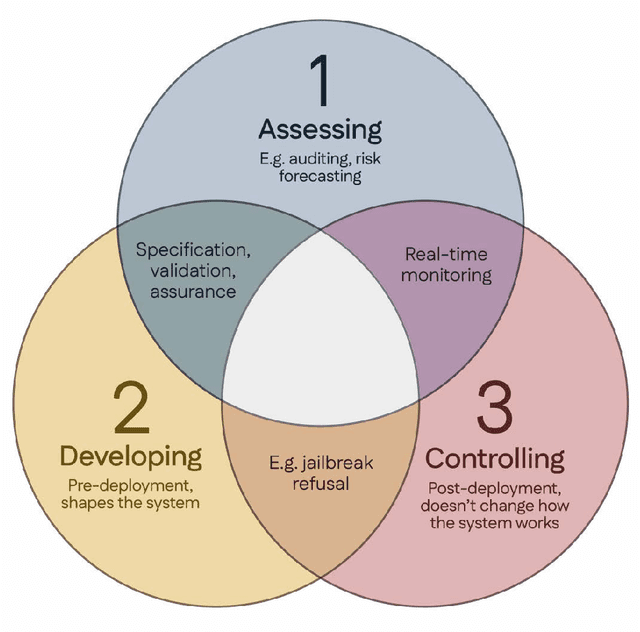
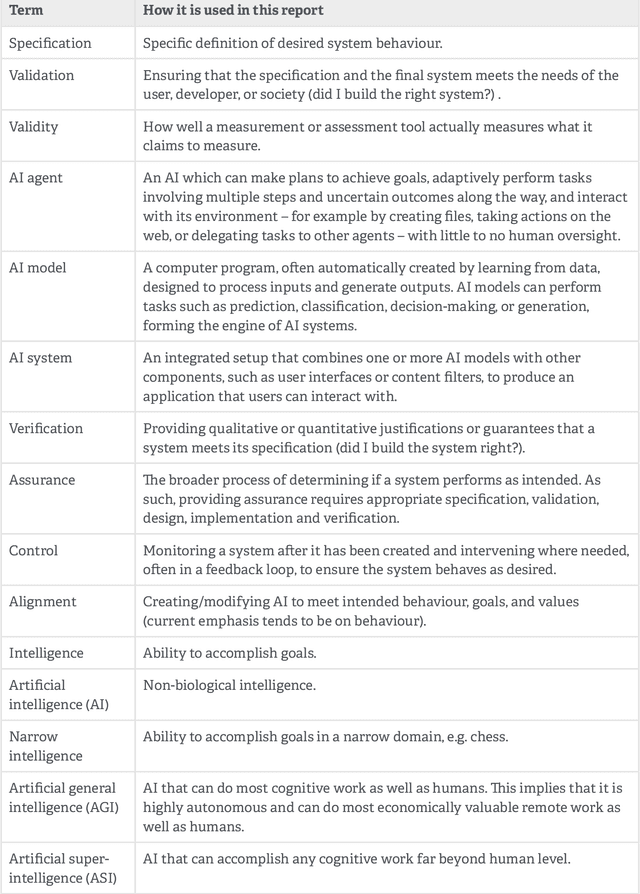
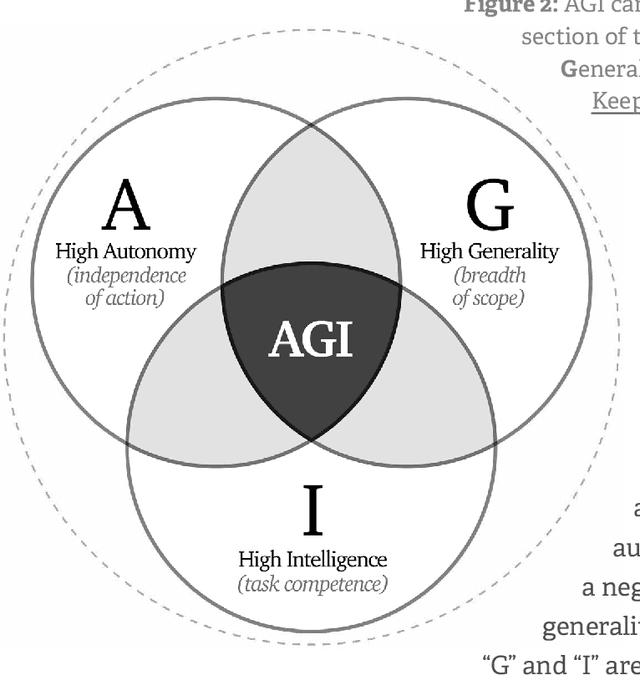
Abstract:Rapidly improving AI capabilities and autonomy hold significant promise of transformation, but are also driving vigorous debate on how to ensure that AI is safe, i.e., trustworthy, reliable, and secure. Building a trusted ecosystem is therefore essential -- it helps people embrace AI with confidence and gives maximal space for innovation while avoiding backlash. The "2025 Singapore Conference on AI (SCAI): International Scientific Exchange on AI Safety" aimed to support research in this space by bringing together AI scientists across geographies to identify and synthesise research priorities in AI safety. This resulting report builds on the International AI Safety Report chaired by Yoshua Bengio and backed by 33 governments. By adopting a defence-in-depth model, this report organises AI safety research domains into three types: challenges with creating trustworthy AI systems (Development), challenges with evaluating their risks (Assessment), and challenges with monitoring and intervening after deployment (Control).
Darwin Godel Machine: Open-Ended Evolution of Self-Improving Agents
May 29, 2025Abstract:Today's AI systems have human-designed, fixed architectures and cannot autonomously and continuously improve themselves. The advance of AI could itself be automated. If done safely, that would accelerate AI development and allow us to reap its benefits much sooner. Meta-learning can automate the discovery of novel algorithms, but is limited by first-order improvements and the human design of a suitable search space. The G\"odel machine proposed a theoretical alternative: a self-improving AI that repeatedly modifies itself in a provably beneficial manner. Unfortunately, proving that most changes are net beneficial is impossible in practice. We introduce the Darwin G\"odel Machine (DGM), a self-improving system that iteratively modifies its own code (thereby also improving its ability to modify its own codebase) and empirically validates each change using coding benchmarks. Inspired by Darwinian evolution and open-endedness research, the DGM maintains an archive of generated coding agents. It grows the archive by sampling an agent from it and using a foundation model to create a new, interesting, version of the sampled agent. This open-ended exploration forms a growing tree of diverse, high-quality agents and allows the parallel exploration of many different paths through the search space. Empirically, the DGM automatically improves its coding capabilities (e.g., better code editing tools, long-context window management, peer-review mechanisms), increasing performance on SWE-bench from 20.0% to 50.0%, and on Polyglot from 14.2% to 30.7%. Furthermore, the DGM significantly outperforms baselines without self-improvement or open-ended exploration. All experiments were done with safety precautions (e.g., sandboxing, human oversight). The DGM is a significant step toward self-improving AI, capable of gathering its own stepping stones along paths that unfold into endless innovation.
Questioning Representational Optimism in Deep Learning: The Fractured Entangled Representation Hypothesis
May 16, 2025Abstract:Much of the excitement in modern AI is driven by the observation that scaling up existing systems leads to better performance. But does better performance necessarily imply better internal representations? While the representational optimist assumes it must, this position paper challenges that view. We compare neural networks evolved through an open-ended search process to networks trained via conventional stochastic gradient descent (SGD) on the simple task of generating a single image. This minimal setup offers a unique advantage: each hidden neuron's full functional behavior can be easily visualized as an image, thus revealing how the network's output behavior is internally constructed neuron by neuron. The result is striking: while both networks produce the same output behavior, their internal representations differ dramatically. The SGD-trained networks exhibit a form of disorganization that we term fractured entangled representation (FER). Interestingly, the evolved networks largely lack FER, even approaching a unified factored representation (UFR). In large models, FER may be degrading core model capacities like generalization, creativity, and (continual) learning. Therefore, understanding and mitigating FER could be critical to the future of representation learning.
The AI Scientist-v2: Workshop-Level Automated Scientific Discovery via Agentic Tree Search
Apr 10, 2025

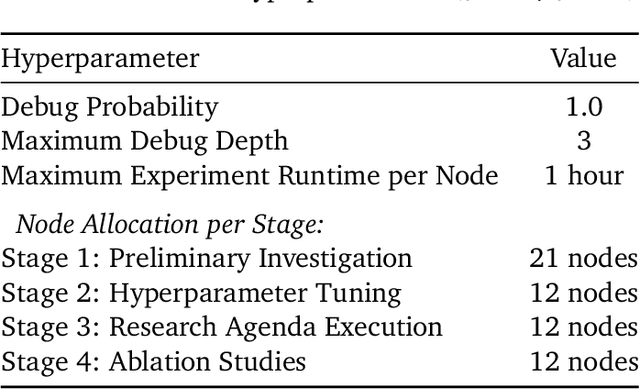
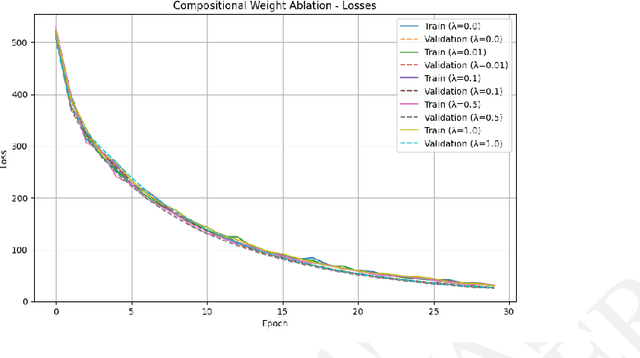
Abstract:AI is increasingly playing a pivotal role in transforming how scientific discoveries are made. We introduce The AI Scientist-v2, an end-to-end agentic system capable of producing the first entirely AI generated peer-review-accepted workshop paper. This system iteratively formulates scientific hypotheses, designs and executes experiments, analyzes and visualizes data, and autonomously authors scientific manuscripts. Compared to its predecessor (v1, Lu et al., 2024 arXiv:2408.06292), The AI Scientist-v2 eliminates the reliance on human-authored code templates, generalizes effectively across diverse machine learning domains, and leverages a novel progressive agentic tree-search methodology managed by a dedicated experiment manager agent. Additionally, we enhance the AI reviewer component by integrating a Vision-Language Model (VLM) feedback loop for iterative refinement of content and aesthetics of the figures. We evaluated The AI Scientist-v2 by submitting three fully autonomous manuscripts to a peer-reviewed ICLR workshop. Notably, one manuscript achieved high enough scores to exceed the average human acceptance threshold, marking the first instance of a fully AI-generated paper successfully navigating a peer review. This accomplishment highlights the growing capability of AI in conducting all aspects of scientific research. We anticipate that further advancements in autonomous scientific discovery technologies will profoundly impact human knowledge generation, enabling unprecedented scalability in research productivity and significantly accelerating scientific breakthroughs, greatly benefiting society at large. We have open-sourced the code at https://github.com/SakanaAI/AI-Scientist-v2 to foster the future development of this transformative technology. We also discuss the role of AI in science, including AI safety.
Automated Capability Discovery via Model Self-Exploration
Feb 12, 2025Abstract:Foundation models have become general-purpose assistants, exhibiting diverse capabilities across numerous domains through training on web-scale data. It remains challenging to precisely characterize even a fraction of the full spectrum of capabilities and potential risks in any new model. Existing evaluation approaches often require significant human effort, and it is taking increasing effort to design ever harder challenges for more capable models. We introduce Automated Capability Discovery (ACD), a framework that designates one foundation model as a scientist to systematically propose open-ended tasks probing the abilities of a subject model (potentially itself). By combining frontier models with ideas from the field of open-endedness, ACD automatically and systematically uncovers both surprising capabilities and failures in the subject model. We demonstrate ACD across a range of foundation models (including the GPT, Claude, and Llama series), showing that it automatically reveals thousands of capabilities that would be challenging for any single team to uncover. We further validate our method's automated scoring with extensive human surveys, observing high agreement between model-generated and human evaluations. By leveraging foundation models' ability to both create tasks and self-evaluate, ACD is a significant step toward scalable, automated evaluation of novel AI systems. All code and evaluation logs are open-sourced at https://github.com/conglu1997/ACD.
The AI Scientist: Towards Fully Automated Open-Ended Scientific Discovery
Aug 15, 2024



Abstract:One of the grand challenges of artificial general intelligence is developing agents capable of conducting scientific research and discovering new knowledge. While frontier models have already been used as aides to human scientists, e.g. for brainstorming ideas, writing code, or prediction tasks, they still conduct only a small part of the scientific process. This paper presents the first comprehensive framework for fully automatic scientific discovery, enabling frontier large language models to perform research independently and communicate their findings. We introduce The AI Scientist, which generates novel research ideas, writes code, executes experiments, visualizes results, describes its findings by writing a full scientific paper, and then runs a simulated review process for evaluation. In principle, this process can be repeated to iteratively develop ideas in an open-ended fashion, acting like the human scientific community. We demonstrate its versatility by applying it to three distinct subfields of machine learning: diffusion modeling, transformer-based language modeling, and learning dynamics. Each idea is implemented and developed into a full paper at a cost of less than $15 per paper. To evaluate the generated papers, we design and validate an automated reviewer, which we show achieves near-human performance in evaluating paper scores. The AI Scientist can produce papers that exceed the acceptance threshold at a top machine learning conference as judged by our automated reviewer. This approach signifies the beginning of a new era in scientific discovery in machine learning: bringing the transformative benefits of AI agents to the entire research process of AI itself, and taking us closer to a world where endless affordable creativity and innovation can be unleashed on the world's most challenging problems. Our code is open-sourced at https://github.com/SakanaAI/AI-Scientist
Automated Design of Agentic Systems
Aug 15, 2024



Abstract:Researchers are investing substantial effort in developing powerful general-purpose agents, wherein Foundation Models are used as modules within agentic systems (e.g. Chain-of-Thought, Self-Reflection, Toolformer). However, the history of machine learning teaches us that hand-designed solutions are eventually replaced by learned solutions. We formulate a new research area, Automated Design of Agentic Systems (ADAS), which aims to automatically create powerful agentic system designs, including inventing novel building blocks and/or combining them in new ways. We further demonstrate that there is an unexplored yet promising approach within ADAS where agents can be defined in code and new agents can be automatically discovered by a meta agent programming ever better ones in code. Given that programming languages are Turing Complete, this approach theoretically enables the learning of any possible agentic system: including novel prompts, tool use, control flows, and combinations thereof. We present a simple yet effective algorithm named Meta Agent Search to demonstrate this idea, where a meta agent iteratively programs interesting new agents based on an ever-growing archive of previous discoveries. Through extensive experiments across multiple domains including coding, science, and math, we show that our algorithm can progressively invent agents with novel designs that greatly outperform state-of-the-art hand-designed agents. Importantly, we consistently observe the surprising result that agents invented by Meta Agent Search maintain superior performance even when transferred across domains and models, demonstrating their robustness and generality. Provided we develop it safely, our work illustrates the potential of an exciting new research direction toward automatically designing ever-more powerful agentic systems to benefit humanity.
Intelligent Go-Explore: Standing on the Shoulders of Giant Foundation Models
May 30, 2024Abstract:Go-Explore is a powerful family of algorithms designed to solve hard-exploration problems, built on the principle of archiving discovered states, and iteratively returning to and exploring from the most promising states. This approach has led to superhuman performance across a wide variety of challenging problems including Atari games and robotic control, but requires manually designing heuristics to guide exploration, which is time-consuming and infeasible in general. To resolve this, we propose Intelligent Go-Explore (IGE) which greatly extends the scope of the original Go-Explore by replacing these heuristics with the intelligence and internalized human notions of interestingness captured by giant foundation models (FMs). This provides IGE with a human-like ability to instinctively identify how interesting or promising any new state is (e.g. discovering new objects, locations, or behaviors), even in complex environments where heuristics are hard to define. Moreover, IGE offers the exciting and previously impossible opportunity to recognize and capitalize on serendipitous discoveries that cannot be predicted ahead of time. We evaluate IGE on a range of language-based tasks that require search and exploration. In Game of 24, a multistep mathematical reasoning problem, IGE reaches 100% success rate 70.8% faster than the best classic graph search baseline. Next, in BabyAI-Text, a challenging partially observable gridworld, IGE exceeds the previous SOTA with orders of magnitude fewer online samples. Finally, in TextWorld, we show the unique ability of IGE to succeed in settings requiring long-horizon exploration where prior SOTA FM agents like Reflexion completely fail. Overall, IGE combines the tremendous strengths of FMs and the powerful Go-Explore algorithm, opening up a new frontier of research into creating more generally capable agents with impressive exploration capabilities.
 Add to Chrome
Add to Chrome Add to Firefox
Add to Firefox Add to Edge
Add to Edge